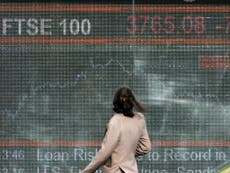These are the most important economic stories breaking this week
The first thing you'll spot will be cracks in US share valuations


This will be another week when the investment community wonders whether there is enough good news around in the world economy to sustain record share prices. The paradox remains that while many people are fearful about politics, at least in the developed world, the financial markets are calm and confident. Not only are shares in most markets at record highs, but volatility is the lowest it has been for a generation. Insofar as volatility indicates fear, there is little fear about.
So the first thing to look for will be cracks in US share valuations. They are roughly the same as they were at the 2007 peak – it depends a bit on how you measure them – and have only been exceeded in 1929 and early 2000. For what it is worth, Longview Economics, which studies cycles in investment values, thinks that there is still a little way to go before the downturn, but this is clearly a time to be wary.
Part of the problem is that the US and European economic cycles have detached from each other. The US is now at or close to full employment and inflation is rising; Continental Europe is not and inflation remains subdued. US interest rates will rise again next month, whereas the expectation for the first increase in eurozone rates is not until 2018 at the earliest. (That is much the same for the UK, notwithstanding the fact that the UK growth phase is more like the US.) So look for financial tension between the US and Europe: will rising US bond yields pull up European ones? And will that increase concern about indebted Italy?
In the UK there are two bits of data that in a closer election fight might be significant. On Tuesday we have inflation numbers, which are being pushed up not only by the delayed impact of a weaker pound but also by Government action. Council tax is up 4 per cent and other budget changes such as higher tax on new cars are adding to pressures. So expect the Consumer Price Index to go up from 2.3 per cent to 2.6 per cent, maybe a bit more.
We also have the last labour market figures before the election. Unemployment will probably stay at 4.7 per cent, but with earnings up only about 2.3 per cent, wages will again have slipped below prices. The squeeze on incomes is back. That will be temporary, partly because sterling is recovering and will soon be reducing inflation – car fuel has become cheaper thanks to this recovery. But the squeeze gives support to those who believe Brexit will hit living standards.
Finally, this week sees a number of British companies reporting their full year results, including EasyJet and Vodafone. Is Great Britain PLC still confident about the future? Or have political and European concerns taken hold? Listen to what is said as much as to the actual numbers, which reflect the past. I expect that corporate twitchiness will be very much in evidence.


Join our commenting forum
Join thought-provoking conversations, follow other Independent readers and see their replies